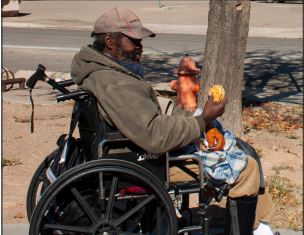
By CAYLEE HANNA
Page Editor
With winter approaching, new hardships are presented to the homeless people in Amarillo. They often have to seek shelter in order to prevent hyperthermia and frostbite to survive the cold winter months.
Paul Johnson is head of homeless ministries for The Loft church, head of security for code blue warming station, and runs Love In Action urban ministries, he said that the City of Amarillo does well when it comes to making sure the homeless shelters operate properly and the Amarillo police department makes sure the homeless are safe during the winter.
“The city does a good job making sure that shelters have access to many forms of funding to make sure they can operate properly,” Johnson said. “And the Amarillo police department does a great job of reaching out to the homeless during the real bad weather to make sure they are safe.”
Adam Leathers, senior director of the community impact of the United Way of Amarillo and Canyon, said that the city of Amarillo acknowledges the issue surrounding homelessness, but the citizens in the city don’t want homeless people near them, which doesn’t help the problem at hand.
“By my estimation, the city of Amarillo does recognize homelessness as a problem and takes it seriously,” Leathers said. “I believe a deeper concern lies with many citizens of Amarillo and Canyon who seem to want to turn a blind eye to homelessness and simply want to usher them out of their respective areas instead of actually assessing the problem. There is a problematic sense of NIMBY—‘notin my back yard’—with many of us.
Many people simply don’t want homeless people in their neighborhood; but this is not a helpful way to address homelessness, as simply moving these people to a different part of the city is both dehumanizing and accomplishes nothing.”
Johnson said that even though the city is helping the homeless get off the streets, itis only for a temporary amount of time before they are back on the streets again and that the city also needs to hold the homeless shelters accountable.“I think the city should hold shelters accountable,” he said. “Which for the most part they do but if a shelter is leaving people out in the cold for unacceptable reasons that should affect the funding they get and it should go to the ones that are stepping up.
The city did a great job getting people housed and off the streets but the casework and follow-up have lacked, so a lot have ended up back in the streets.”
According to the national coalition for the Homeless’website, homeless people are prone to hypothermia and frostbite during the winter which can be fatal.
“With nowhere to stay except the streets, people experiencing homelessness have a much higher risk than the general population of developing exposure-related conditions such as hypothermia and frostbite,” the website, says. “These conditions can be immediately life-threatening and may also increase the risk of dying from unrelated conditions in the future.”
Johnson said that although the cold weather is a major problem for homeless people, they are also highly affected by mental health problems and help needs to be provided.
“The general consensus is the city wants the homeless to go away and that will never happen,” he said. “What needs to happen is there needs to be a huge push to get mental health help out there for them. Most people don understand how big the mental health issue is out in the streets. Also, we need options for true full rehabs. It’s almost impossible to get someone into rehab.
Homelessness has to be treated at the core. Government officials, from local to federal, always want to treat the symptoms, not the real issues. When you have cancer, you don’t just give them pain meds and hope it goes away. You have to attack at the cellar level.”Leathers said that homelessness has a negative connotation around it, but it is a systemic issue that needs to be solved.
“People who are homeless are not in this position in life, by choice,” he said. “It eases the collective consciousness of the privileged to believe they are lazy or prefer to be nomadic, instead of confronting systemic problems that contribute to homelessness including job loss or cyclical poverty, mental health issues, addiction issues, lack of health care, incarceration and
several others.”

Leave a Reply